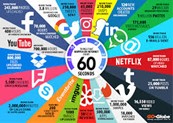
Unit 4
The Internet or Printed Materials?

- Pre-reading task.
Answer the following questions:
1) Do you use online sources in everyday life?
2) Add two or more benefits of using online sources:
- a) they provide you by a significant amount of free information;
- b) they keep you up to date;
- c) you can easily get the needed information without wasting
- Read the article
In the past, without the widespread presence of the Internet, people made use of printed materials for information. However, the Internet apparently wires in every corner of the world by now. Hence, most information now is referenced from the Internet, which I totally in favour of. This article will explore the reasons for such a choice.
To begin with, searching for information from the Internet is less time-consuming than from books and articles. It is because of the introduction of searching engines, which allow the exploration of millions of data. All users have to do is to type down the questions that they feel dubious, and all sorts of answers emerge at the click of a button. For example, when an Internet user asks for “How to say hello in English”, the searching engine on the Internet will reply with thousands answers on the dot. Compared to the printed one, it is far faster. On using books, readers have to look up the content and spend time looking for the pages. For this reason, it would take at least several minutes to do the book-searching procedures.
Secondly, the Internet can provide more sufficient answers than the other can. The Internet is dominated by billions of people. Among these people, there are possibly thousands of experts coming from different fields. So, when someone proposes a question, it can be answered by different experts. Consequently, the response to the question may possibly never get inaccurate. Meanwhile, the author who writes a book, whose authority on their subject might be profound, can make a mistake. But, since he authorizes the book by himself, the mistake will surely be overlooked. A classic case in point for this is the recently published result from the findings from Harvard University. It has pointed out clearly that nearly 75% of the book contains some erroneous details, while the Internet only publishes 20% false information. Finally, the finding constitutes a conclusion that the reliability of the Internet overwhelms that of the printed material.
In the final analysis, the Internet is a worthier source of reference for researching than the other one. Therefore, we should appreciate the essence of the Internet for researching purpose because the Internet are not sure to be here to stay.
Source: https://essayforum.com
- According to the article, are these sentences True (T) or False (F)?
|
1. Searching for information from the Internet is more time-consuming than from books and articles. |
T/F |
|
2. On using books, readers have to look up the content and spend time looking for the pages. |
T/F |
|
3. The Internet can provide more sufficient answers than the other can. |
T/F |
|
4. The author who writes a book, whose authority on their subject might be profound, cannot make a mistake. |
T/F |
|
5. It would take at least several hours to do the book-searching procedures in Internet. |
T/F |
- Vocabulary work. Make up your own sentences using these words:

- Online sources for environmental news
Using Google Search find 5 Top News Sources and share your information in the forum naming the source and the main issues.
- Writing essay. Write a 3-paragraph essay.
Compare online sources and printed material (books, articles). Write down the advantages and disadvantages of these two sources. Use specific reasons and examples to support your answer.